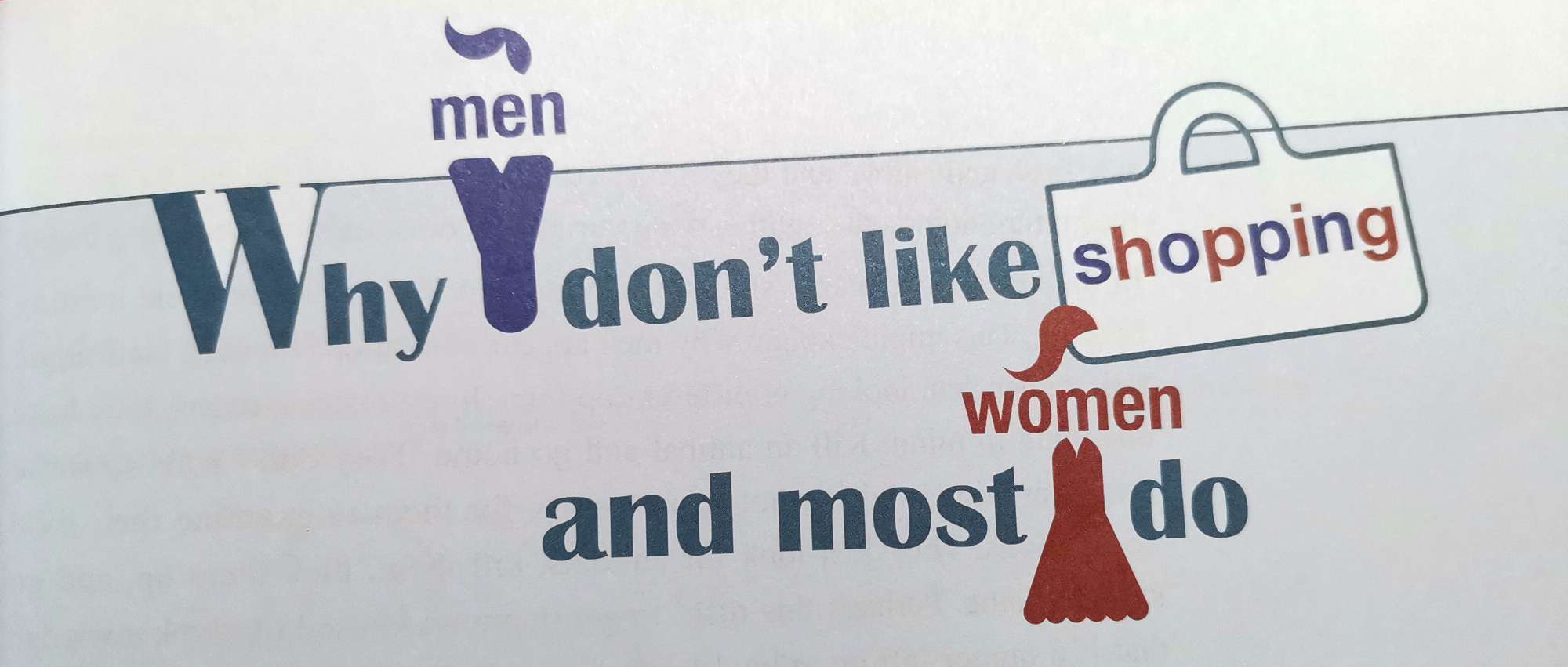Why men don't like shopping and most women do
1 Do you like shopping? The answer may partly depend on one factor: whether you are male or female. Of course, it's a generalization to say, "Women like shopping and men don't" — I'm sure we all know people to whom this doesn't apply. However, there is evidence that this isn't a complete myth. A survey of 2,000 British people found that men became bored after only 26 minutes of shopping, while it took women a full two hours. The survey found that 80 percent of men didn't like shopping with their partners, and that 45 percent avoided doing so at all costs. Almost half of all spousal shopping trips ended in arguments, with men becoming frustrated, because they bought what they needed straight away, while their partners were still looking and taking too long to make decisions.
2 If there is some validity to these generalizations — and if they are more than just the result of social conditioning — where could these different attitudes to shopping stem from?
3 For hundreds of thousands of years, until around 8,000 B.C.E., all human beings lived as hunter-gatherers — that is, they survived by hunting wild animals (the man's job) and foraging for wild plants, nuts, and fruits (the woman's job).
4 Beginning in the Middle East, human communities began to switch to farming around 8,000 B.C.E., and slowly, over the following millennia, the practice spread widely throughout Asia and Europe. But after so many hundreds of thousands of years of living as hunter-gatherers, it's no surprise that hunting and gathering are still instinctive to us. And this brings us back to shopping — because these instincts may show themselves in our shopping habits. When most women shop, they are in more of a "gathering" mode — browsing from tree to tree (or shop to shop), looking for ripe and nutritious fruits. They spend a lot of time examining the food, checking whether it is fresh and edible, and they discard quite a lot of it. At the end of the trip, they return home laden with a wide variety of foodstuffs (or shopping bags).
5 In the same way, men's shopping habits may be related to their hunting heritage. This might explain why men appear to be more focused on a single task, rather than looking at different options. In prehistoric terms, they have one thing in mind: Kill an animal and go home. They don't want to waste time searching, and it's not so necessary for them to examine their food acquisitions. They just look for animals, kill them, pick them up, and go straight home. Perhaps this rush to get home was based on the knowledge that if a hunter left an animal lying for too long, other animals or insects would start to eat it. Some dead animals would also have been heavy, and so difficult to carry around for long. Also, in hot and humid conditions, it wouldn't be long before the meat would start to go bad.
6 Let me repeat that these are generalizations — there are undoubtedly millions of men and women to whom these characteristics don't apply. And it may seem silly to make these connections between modern shopping habits and hunter-gatherer traits. But if there is a tendency for men and women to shop in these different ways, then it could be explained in terms of our hunter-gatherer past.
7 Of course, I eventually realized that I'm not the only person who has thought of it. Several years ago, anthropologists Kruger and Byker found very clear similarities between modern men and women's shopping habits and our hunter-gatherer past. They found that women "scored higher on skills and behaviors associated with gathering … even though the environment and the objects being gathered have changed with respect to our ancestral environment. Also as predicted, men scored higher on skills and behaviors associated with hunting." They found that women were more inclined to spend extended time browsing around shopping malls, while men were more inclined to buy what they needed and then leave straight away. Their findings supply empirical evidence for the connections I'm making in this article.
8 One good thing about this: It provides justification for our shopping habits. You can always use the excuse that you can't help liking (or not liking) shopping, because you inherited those instincts from our prehistoric past. More seriously, this might also help us to overcome the impulse to buy unnecessary material goods.
9 Once you become aware of the reasons for a behavior, it becomes easier to control and overcome it. I'm not saying that we should stop shopping, but perhaps we should shop in a more sensible way and bring our buying more in line with our needs than our desires.
10 But, then again, I am a man, after all.

更多:
Travel in Europe(新编大学英语U2R1)
本号:662967
Have a lover, have friends, or read books?(新编大学英语U5R1)
本号:219227
The story of a nation in sandwiches(新编大学英语U6R1)
本号:694169
